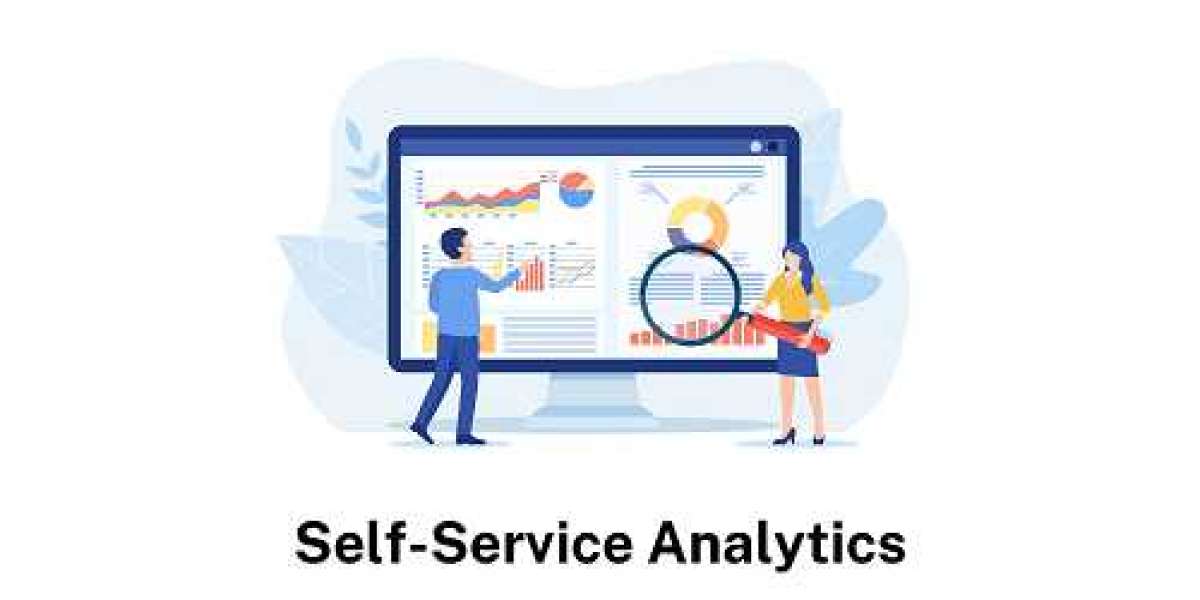Self-Service Analytics Market: A Comprehensive Overview
The self-service analytics market has experienced significant growth over the past decade, driven by the increasing demand for data-driven decision-making across various industries. Self-service analytics tools empower business users to generate insights without relying heavily on IT departments, thereby accelerating the decision-making process and enhancing operational efficiency. As businesses strive to become more agile and data-centric, the adoption of self-service analytics solutions is expected to continue its upward trajectory.
Self-Service Analytics Market Overview:
The Self-Service Analytics Market is projected to grow from USD 4.88 billion in 2024 to USD 17 billion by 2032, exhibiting a compound annual growth rate (CAGR) of 16.86% during the forecast period (2024 - 2032). Self-service analytics refers to the tools and platforms that enable end-users to analyze data, create reports, and derive insights independently. These tools are designed to be user-friendly, allowing individuals with limited technical expertise to perform complex data analyses. The market for self-service analytics is growing rapidly, fueled by the need for real-time insights, the proliferation of big data, and the increasing importance of data democratization within organizations. The market encompasses a variety of solutions, including business intelligence platforms, data visualization tools, and advanced analytics applications.
Get a sample PDF of the report at –
https://www.marketresearchfuture.com/sample_request/1984
Industry News:
Recent industry developments highlight the dynamic nature of the self-service analytics market. Leading technology companies are continuously enhancing their analytics offerings to cater to the evolving needs of businesses. For instance, major players like Microsoft, Tableau, and Qlik have introduced new features and integrations to improve user experience and analytical capabilities. Additionally, the rise of artificial intelligence and machine learning is significantly impacting the market, with many self-service analytics tools now incorporating AI-driven insights and predictive analytics to provide deeper, more actionable insights.
Frequently Asked Questions (FAQs)
- What is self-service analytics?
Self-service analytics refers to tools and platforms that enable non-technical users to perform data analysis, generate reports, and derive insights without the need for extensive IT support.
- Why is self-service analytics important?
It empowers business users to make data-driven decisions quickly, reduces dependency on IT departments, and fosters a culture of data democratization within organizations.
- What are the key features of self-service analytics tools?
Key features include user-friendly interfaces, drag-and-drop functionality, data visualization capabilities, and integration with various data sources.
- Which industries benefit the most from self-service analytics?
Industries such as retail, healthcare, finance, manufacturing, and telecommunications benefit significantly from self-service analytics due to the vast amounts of data they generate and the need for timely insights.
- How is AI impacting the self-service analytics market?
AI is enhancing self-service analytics tools by providing advanced features like predictive analytics, automated insights, natural language processing, and anomaly detection, thereby making data analysis more intuitive and powerful.
Market Segmentation:
The self-service analytics market can be segmented based on several factors, including deployment mode, organization size, industry vertical, and region. Deployment modes include on-premises and cloud-based solutions, with cloud-based solutions gaining popularity due to their scalability and lower upfront costs. Organization size segmentation highlights the adoption of these tools by small and medium-sized enterprises (SMEs) as well as large enterprises. Industry verticals adopting self-service analytics range from healthcare and retail to finance and telecommunications, each leveraging data analytics to drive efficiency and innovation.
Market Key Players:
- Microsoft Corporation
- Tableau Software
- Qlik Technologies
- IBM Corporation
- SAP SE
- SAS Institute Inc.
- MicroStrategy Incorporated
- TIBCO Software Inc.
- Oracle Corporation
- Alteryx, Inc.
Regional Analysis:
The self-service analytics market is witnessing substantial growth across various regions, including North America, Europe, Asia-Pacific, Latin America, and the Middle East and Africa. North America holds the largest market share, driven by the presence of major technology companies, advanced IT infrastructure, and high adoption rates of innovative technologies. Europe follows closely, with significant investments in data analytics and digital transformation initiatives. The Asia-Pacific region is expected to exhibit the highest growth rate, fueled by the increasing adoption of self-service analytics in emerging economies like China and India, along with growing awareness of the benefits of data-driven decision-making.
Browse a Full Report –
https://www.marketresearchfuture.com/reports/self-service-analytics-market-1984
Recent Developments:
Recent developments in the self-service analytics market underscore the continuous innovation and expansion in this field. Companies are focusing on enhancing the user experience by integrating natural language processing (NLP) and AI capabilities into their analytics tools, making it easier for users to interact with data and generate insights. Additionally, partnerships and collaborations between analytics providers and other technology firms are becoming more common, aimed at delivering more comprehensive and integrated solutions. For example, Microsoft’s integration of Power BI with Azure Synapse Analytics exemplifies how combining analytics platforms with cloud services can enhance data analysis capabilities. Moreover, the trend towards incorporating advanced data governance and security features is gaining traction, ensuring that self-service analytics solutions comply with regulatory standards and safeguard sensitive information.
The self-service analytics market is poised for continued growth as businesses across the globe increasingly recognize the value of empowering their employees with data-driven insights. The ongoing advancements in technology, combined with the expanding adoption across various industries and regions, signal a promising future for self-service analytics solutions.
Top Trending Reports:
Enterprise Content Management Market
Reference Check Software Market
Contact
Market Research Future (Part of Wantstats Research and Media Private Limited)
99 Hudson Street, 5Th Floor
New York, NY 10013
United States of America
+1 628 258 0071 (US)
+44 2035 002 764 (UK)
Email: [email protected]
Website: https://www.marketresearchfuture.com








